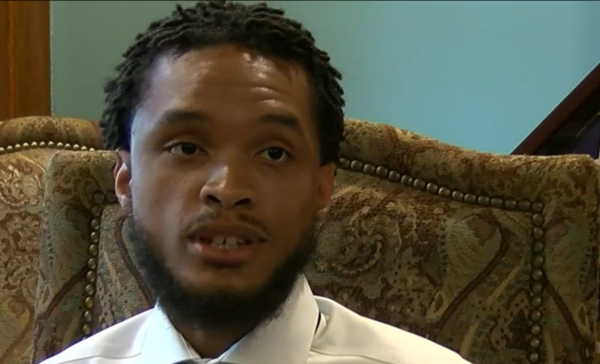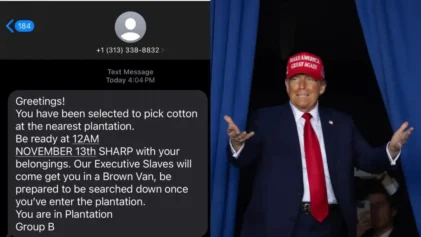Arthur Jones, 29, was 23 years old when he was arrested and charged with the murder of a teenager in 2015, despite the fact that video footage showed he was 70 miles away from where the crime was committed at the time of the shooting. More than six years later, Jones has filed a lawsuit against the Hattiesburg Police Department, the City of Hattiesburg, and the detective who pursued the charges.

Jabarri Goudy, 17, was killed outside of a Hattiesburg, Mississippi, club at around 2 a.m. n July 5, 2015. Just days later, Jones was arrested and charged with Goudy’s murder 70 miles away. Although surveillance footage showed Jones was in Gulfport when the shooting occurred, authorities moved forward with bringing charges against him and Jones remained behind bars for nine months, and even after getting out on bond the charges remained over his head for a time when another suspect was indicted in the teen’s death.
Jones and Keith Lee, who was also wrongly accused in the teen’s death as an accessory because he provided an alibi for Jones, filed separate lawsuits in 2018 against Sgt. Neal Rockhold, who pursued the charges despite the evidence that the two weren’t involved in Goudy’s death. However, the suit was put on hold after Rockhold was deployed by the military. Now, the case is going to trial and Jones is seeking monetary relief from both the city of Hattiesburg and Rockhold after he was wrongfully imprisoned.
According to the suit, Rockhold was well aware of the “misconduct, the suppression of exculpatory evidence, and the fabrication of a false case against Jones.”
“There has never any legitimate evidence connecting Plaintiff Arthur J. Jones Jr., to the murder of Jabarri Goudy and the Plaintiff was not even present in the City of Hattiesburg at the time of the murder,” the suit says.
The legal filing, obtained by Atlanta Black Star, notes that when Goudy was shot outside of Club Memories in Hattiesburg, Jones, Lee and others were at a club in Gulfport. After false rumors implicating Jones in the slaying began spreading on social media in the days immediately after the killing, knowing he was innocent and thinking he would be cleared, Jones voluntarily went to Hattiesburg to talk to police, who questioned him, and, discounting his protestations of innocence and alibis, placed him under arrest.
When confronted with surveillance footage showing Jones was in Gulfport, authorities, including Rockhold, alleged that the dates were either wrong or had been purposely changed. Defendants in the suit include Rockhold and three unnamed John Does.
In addition, Rockhold came up with a false narrative to support the assertion that Jones was involved in Goudy’s death and contacted Jones’ ex-girlfriend, Nijah Gray-Lane, claiming a fight that led to the teen’s death was over her even though she also was nowhere near Hattiesburg at the time of the slaying.
“Despite having no prior felony record or even felony arrests, Plaintiff was placed under a $500,000.00 bond which was eventually reduced to the “paltry” sum of $400,000.00,” the suit says. While Jones was in jail, Rockhold allegedly lied to him, saying he’d failed a polygraph test.
Then, in March 2016, Jones’ bond was suddenly reduced to $50,000, which enabled him to be released under the condition that he remained charged with Goudy’s murder. Each month, until October 2017, Jones had to drive 70 miles to Hattiesburg to “sign in” or he would be jailed again. However, Jones was unaware for months that Andreco Deshun Guston had been indicted in March 2017 for Goudy’s murder as the charges against Jones remained.
“After Andreco Deshun Guston was determined to be the murderer of Jabarri Goudy, Defendants have given no explanation as to why the Defendant, Rockhold’s, affidavit which resulted in the issuance of an arrest warrant was not immediately withdrawn and/or the Justice Court advised that said affidavit under oath was no longer true or that said did not immediately move to dismiss the charge against the Plaintiff,” Jones’ attorneys say in the suit documents.
Rockhold attempted to have the suit dismissed early this year, claiming he should be given immunity because he was acting in his official capacity as a police officer, but his efforts were denied in a 55-page opinion by U.S. District Court Judge Taylor McNeel, who explained why the case should go to trial.
According to McNeel’s opinion, Rockhold told Jones he was “sick and f-cking tired” of Jones lying to him as he reiterated that he wasn’t involved in the murder. Rockhold also told Jones he had photos of him inside the Hattiesburg club on the night of the murder, but later admitted that he did not have a photo or video of Jones in the area on that night. Cellphone records also showed that Jones’ phone had connected to a tower in Gulfport both the night of and morning after the murder.
Rockhold was also aware of circulating rumors on Facebook among people who had no personal knowledge of the case but believed Jones was the shooter, according to McNeel. Rockhold told one witness during an interview, “I know there’s been a lot of pictures going around on Facebook.”
McNeel found that Jones had not demonstrated that Hattiesburg was deliberately indifferent in the training
and supervision of its officers, and dismissed that claim. But the court found that Rockhold was not entitled to qualified immunity on Jones’ allegation of false arrest and unlawful detention. McNeel found that Rockhold omitted information when seeking to obtain an an arrest warrant that may have changed the judge’s mind about whether or not to issue one.
“There was absolutely no physical evidence connecting Jones to the murder scene. Therefore, the municipal judge had to rely on Rockhold’s statements with regard to Jones’ alibi and eyewitness accounts,” the opinion says. “Given the totality of the circumstances, the Court concludes that a reasonable judge would not have issued a warrant on the basis of this corrected affidavit, because the addition of the omitted material facts and the exclusion of the misstated facts would have dissuaded a judge from issuing a warrant.”
Guston is now serving a 30-year sentence with at least 12 years behind bars on the second-degree murder charge in Goudy’s death. The lawsuit against Rockhold is set to go to trial on Nov. 15.


